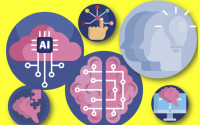
Using Learning Management System to Promote Self-regulated Learning in a Flipped Classroom
The inherent structure of the flipped classroom (FC) supports a learning environment that promotes students’ self-regulated learning. In this paper, we focus on how a Learning Management System (LMS), in this case BrightSpace D2L, plays a key role in supporting all aspects of the FC. We discuss how: Pre-class assignments suggest that students give their […]
















